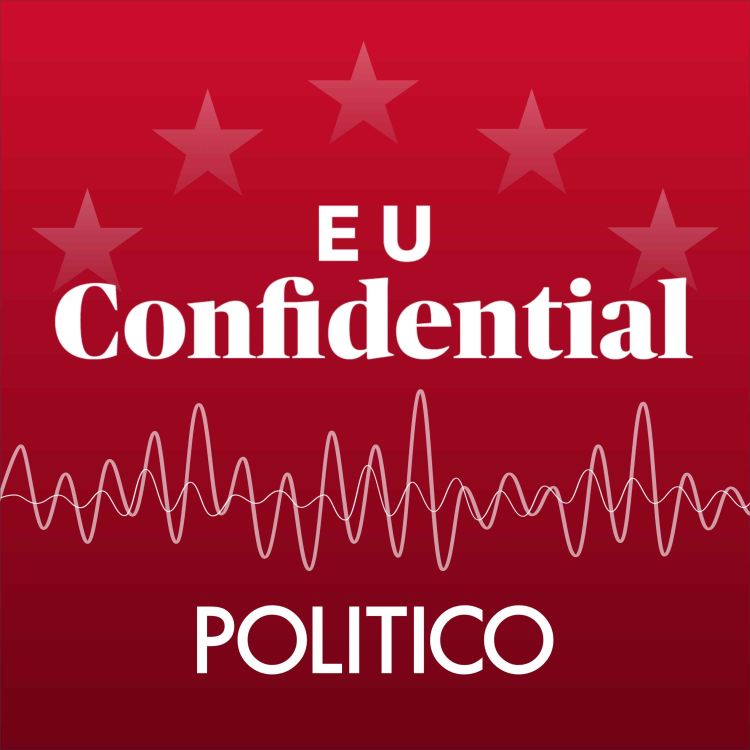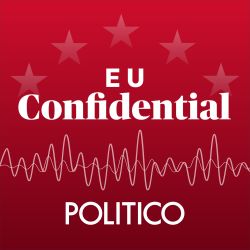Share

POLITICO's EU Confidential
EU's 'Defence of Democracy' debate on combatting foreign influence
This week, we debate the EU's latest attempt to combat foreign influence with its forthcoming "Defence of Democracy package," which some in Brussels claim could result in unintended consequences.
POLITICO's Suzanne Lynch speaks to the European Commission’s special adviser on foreign interference, Ivana Karásková, a Czech academic and expert on Chinese influence. She provides insight into the degree of foreign influence in the European Union. She also explains the rationale behind a specific piece of this package, which is causing concern, particularly among NGOs: potential rules that would subject civil society organizations to report if they receive funding from third-country donors.
Then we're joined by Sarah Wheaton, POLITICO's chief policy correspondent and author of our EU Influence newsletter, and Nicholas Aiossa, deputy director and head of policy and advocacy at Transparency International EU. They dig into the concerns that this package will have unintended consequences for European democracy — and discuss what better tools the Commission could consider with an eye on better transparency in EU advocacy and lobbying.
More episodes
View all episodes

365. EU election latest: Knives out for Ursula von der Leyen
34:57With just weeks to go until the European Parliament election, we're bringing you the state of play.Host Sarah Wheaton is joined by Elisa Braun, POLITICO's Brussels correspondent, and Nicholas Vinocur, POLITICO's editor at large, to discuss the many political challenges facing EPP lead candidate Ursula von der Leyen: "Pfizergate," "Piepergate" and the internal rebellion by a group of fellow commissioners.Later, a panel of keen election watchers — Eddy Wax, who covers the European Parliament for POLITICO, technology reporter Clothilde Goujard and Matteo Albania, communications director at Must Consulting — gives us an update on the new rules for online campaigning (aimed at fighting disinformation and AI-generated deepfakes) and takes stock of the campaign so far.Further reading:EU political parties promise to steer clear of deepfakes ahead of election by Clothilde GoujardEurope wields new tech law to protect EU election by Clothilde GoujardMacron ‘loved’ me sniping at von der Leyen, says French commissioner by Elisa Braun and Eddy WaxVon der Leyen struggles to quell revolt over controversial business envoy pick by Giovanna Faggionato, Nicholas Vinocur and Julia Wacket
364. 'If you want peace, prepare for war': How an old saying is making a comeback in Europe
30:49In this episode, we unpack the growing urgency among EU leaders to defeat Russia's Vladimir Putin. Remember the old Latin saying: si vis pacem, para bellum (if you want peace, prepare for war)? We discuss what that might mean today.We also explain what's at stake in presidential runoff elections in Slovakia and round out our episode exploring why chocolate prices in Europe are skyrocketing and what "greedflation" has to do with it.Host Sarah Wheaton is joined by Barbara Moens, POLITICO's chief EU correspondent, Milan Nič, senior fellow for Central and Eastern Europe at the German Council on Foreign Relations and Alessandro Ford, agriculture reporter at POLITICO.Have a great spring break! We will be back in your feed on April 12.Further reading:"‘Broadening’ consensus on need to defeat Putin among EU leaders, says Lithuanian president," by Jacopo Barigazzi and Barbara Moens"Slovak president election: Pro-EU diplomat tops coalition stalwart in first round," by Tom Nicholson"Slovakia, the EU’s next rule of law headache," by Ketrin Jochecová and Nicolas Camut"Big Chocolate is conning you this Easter," by Alessandro FordAnd finally ...Have your say on Europe’s future at the third edition of the Maastricht Debate. On April 29 at 7 p.m. CET, Studio Europa Maastricht and POLITICO are organizing the debate that will put the candidates in line to lead Europe onstage and in front of the issues that matter to European youth. Find out more and register to watch the 2024 Maastricht Debate by clicking here.
363. Farmers lead the EU climate backlash
34:52As EU leaders received a stark warning about the climate risks facing the bloc, the European Commission caved to farmer protests and demands to slash environmental requirements.Host Sarah Wheaton talks to POLITICO's climate policy reporter Zia Weise about the recent report on climate risks facing the bloc, the first of its kind from the European Environment Agency. We dive into the sobering findings and the reactions.And then Sarah hosts a conversation with POLITICO's senior climate correspondent Karl Mathiesen and Tom Brookes — the head of the Meloire Foundation and one of Brussels' top green lobbyists. Tom reveals new polling on how European citizens view climate issues heading into the European election in June — and they debate the politics of climate blowback.Additional reading ..."5 things we learned from the EU’s big (and first) climate risk report" by Zia Weise"EU takes the ax to green farming rules" by Bartosz Brzeziński"Bears, cars and angry farmers fuel green backlash" by Karl Mathiesen
362. Portuguese voters' anger and what it means for Europe
31:46Portugal's snap election has brought seismic change — the Socialists are now in opposition and the center-right Democratic Alliance, which narrowly won the vote, will try to form a minority government. But the biggest shock came when the far-right, ultra-nationalist, anti-immigrant Chega won more than a million votes and became the third-largest party in parliament.In this episode of EU Confidential, host Sarah Wheaton is joined by POLITICO’s Aitor Hernández-Morales, Barbara Moens and Nicholas Vinocur to break down the results of the vote and discuss what the far-right surge in Portugal could mean for the future of the EU — with the European elections on the horizon and the race for top jobs underway.Later, POLITICO's Stuart Lau interviews Sweden's Prime Minister Ulf Kristersson after his country officially joined NATO.Further readings:Ursula von der Leyen’s reelection campaign gets off to a bumpy start – POLITICOPortugal’s far right comes roaring back – POLITICOPortugal swings right in knife-edge snap election – POLITICO
361. Inside the European People's Party Congress 2024
58:13On this bumper edition of EU Confidential, we take you inside the two-day European People Party's Congress in Bucharest.Host Sarah Wheaton and POLITICO's Eddy Wax reveal what was happening as the center-right EPP sealed the deal on its campaign manifesto and anointed its lead candidate for the European Parliament election: Ursula von der Leyen.They speak exclusively to delegates and key EPP figures including Roberta Metsola, Manfred Weber, Thanasis Bakolas, Leo Varadkar, Michel Barnier, Petteri Orpo, Mariya Gabriel, Peter Liese, Adina Ioana Vălean, Petri Sarvamaa, Dara Murphy and Lídia Pereira.
360. European Parliament election 2024 — state of play
34:28With less than 100 days until the European Parliament election, we bring you the state of play. Also, we hear from Georgian President Salome Zourabichvili about her country's ambitions to join the EU.Host Sarah Wheaton assembles a panel of astute election watchers to break down the key issues and people shaping the discussions as campaigns get underway for the EU election in June: POLITICO's Parliament reporter Eddy Wax; Francesca Romana D'Antuono, co-president of Volt Europa; and Thomas Thaler, co-lead of APCO's EU election task force. And be sure to subscribe to POLITICO's weekly EU Election Playbook, authored by Eddy.Then later in the podcast, Berlin Playbook author Gordon Repinski sits down with Georgian President Salome Zourabichvili to discuss her country's EU aspirations, domestic political tensions and persistent threats from neighboring Russia. You can sign up to receive POLITICO's new Berlin Playbook here.
359. VDL 2.0 — How Europe and Ukraine have changed, two years into Russia's all-out war
39:05As we mark two years of Russia's full-scale invasion of Ukraine, we take stock of how the war has changed Europe's political landscape and identity — as well as life for Ukrainians under siege. Also, we look at Ursula von der Leyen's campaign to remain European Commission chief.Von der Leyen finally announced her intention this week to officially seek another term at the helm following the European Parliament election in June. Host Sarah Wheaton is joined by POLITICO's Hans von der Burchard about the not-so-surprising announcement and what we can expect from von der Leyen's campaign over the coming months. And as mentioned, Hans is part of POLITICO's new Berlin Playbook team — you can subscribe here.Then we turn our focus to Ukraine. Executive Producer Cristina Gonzalez sits down with renowned Bulgarian political scientist Ivan Krastev at the recent Munich Security Conference to unpack how the war in Ukraine has fundamentally changed Europe.And finally, Sarah is joined by our reporter in Kyiv, Veronika Melkozerova, for a poignant personal account of how the war has impacted her and her fellow Ukrainian citizens. You can read Veronika's full story here: "Being Ukrainian in 2024: 'People look at me as if I'm terminally ill'".
358. Europe responds to Donald Trump
29:54Donald Trump has again sent shockwaves across Europe with comments suggesting that he would encourage Russia to invade NATO countries that do not spend enough on defense.In this episode, we discuss reactions in European capitals. Host Sarah Wheaton and her colleagues — senior Paris correspondent Clea Caulcutt, chief Europe correspondent Matthew Karnitschnig and Stuart Lau who covers China and NATO — check whether Trump's criticism of NATO could effectively prompt EU leaders to enhance the bloc's defense capabilities. They also zoom into Budapest where an unexpected political scandal toppled two of Viktor Orbán's biggest loyalists.Later, to mark Valentine's Day, we also talk love. Our guest is Marjorie Libourel, a professional matchmaker based in Brussels. She discusses the challenges of dating and relationships in the Bubble, as well as making connections in an era of political polarization and changing gender roles.Further reading:"Brussels power couples 2024" by Sarah Wheaton and Eddy Wax"Donald Trump just did Europe a favor" by Matthew Karnitschnig"Hungary President Novak quits under pressure over sex-abuse pardon case" by Aitor Hernández-Morales and Stuart Lau
357. Can the EU defend Ukraine (and itself)?
29:40Europe is waking up to the urgent need to strengthen its own defenses — especially as Donald Trump seems poised to capture the Republican nomination and possibly even the White House in November presidential elections.In this episode, host Sarah Wheaton is joined by Florence Gaub, director of research at the NATO Defence College in Rome and a futurist, along with Ivo Daalder, former U.S. ambassador to NATO and president of the Chicago Council on Global Affairs (and a fellow podcaster: World Review with Ivo Daalder). They discuss the "Europeanization of NATO" and other tools that Europe has (or lacks) to support Ukraine and defend itself — with or without Washington.Later, some of POLITICO's in-house defense experts, Laura Kayali and Jan Cienski, discuss the brass-tacks realities of whether Europe can fend off a Russian attack on its own, and outline where it remains most vulnerable.Further reading:"Europe’s Trump challenge: Is it ready to fight Vladimir Putin alone?" by Laura Kayali"What another Trump presidency would mean for NATO" by Ivo Daalder